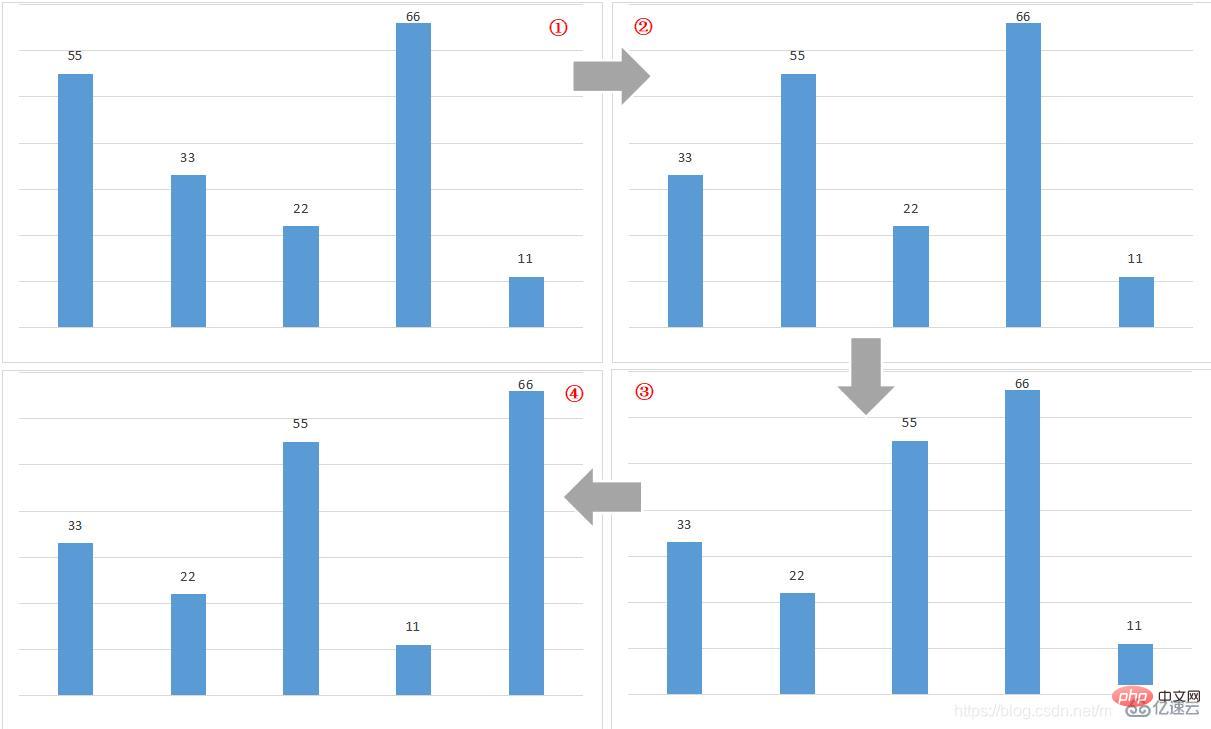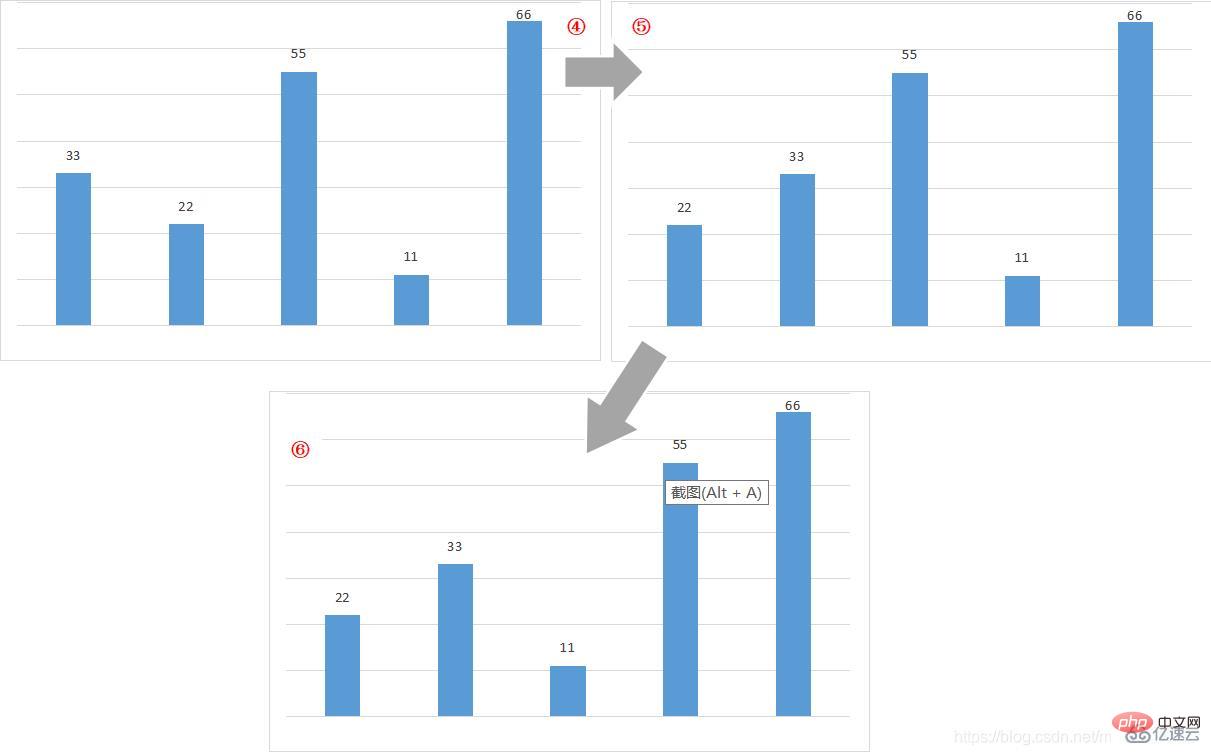How to write code to implement bubble sort in Java

Bubble sorting principle
Compare two adjacent elements. If the first is larger than the second, swap their positions (in ascending order, vice versa in descending order).
Compare each pair of adjacent elements in sequence from the beginning to the end of the list. In this way, the element with the largest value "bubbles" to the end of the list through exchange, completing the first round of "bubbling".
Repeat the previous step and continue to compare adjacent elements in sequence from the beginning of the list. Elements that have "bubbled" out do not need to be compared (you can compare them all the way to the end. Elements that have "bubbled" to the back do not need to be exchanged even if they are compared. Not comparing can reduce steps).
Continue to compare starting from the list, and one element will "bubble" successfully in each round of comparison. The number of elements that need to be compared in each round will decrease until there is only one element left that does not "bubble" (no pair of elements needs to be compared), then the list sorting is completed.
Bubble sorting process
Take this one-dimensional array as an example:
int[] array = new int[]{55,33,22,66,11};First round of bubbles
Figure ① is a column chart of the starting order of the data in the first round of "bubble". As long as the condition is met: "The previous element is larger than the following element, the position order will be exchanged, otherwise no exchange will be made."
array[0]=55 > array[1]=33, if the conditions are met, exchange the position order of the elements, as shown in Figure ②;
array[1]=55 > array[2]=22, if the conditions are met, exchange the position order of the elements, as shown in Figure ③;
- ##array[2] =55 < array[3]=66, the condition is not met, and the position order of the elements is not exchanged, as shown in Figure ③;
- array[3]=66 > array[ 4]=11, if the condition is met, the position order of the elements is exchanged, as shown in Figure ④;

- Figure ④ is a bar chart of the starting order of the data in the second round of "bubble";
- array[0]33 > array[1]=22, if the conditions are met, exchange the position order of the elements, as shown in Figure ⑤; ##array[1 ]33 < array[2]=55, the condition is not met, the position order of the elements is not exchanged, as shown in Figure ⑤;
- array[2]55 > array[3 ]=11, the condition is met, and the position order of the elements is exchanged, as shown in Figure ⑥;
- The second round of "bubble" demonstration is as shown in the figure:
 The third round of bubbling
The third round of bubbling
- Figure ⑥ shows the starting sequence column chart of the data in the third round of "bubble";
- array[0]=22 < array[1]=33, the condition is not met, the position order of the elements is not exchanged, as shown in Figure ⑥;
- ##array [1]=33 > array[2]=11, if the conditions are met, exchange the position order of the elements, as shown in Figure ⑦;
- The third round of "bubble" demonstration is as follows As shown in the figure:
The fourth round of bubbling
- array[0]=22 > array[1]=11, if the condition is met, exchange the position order of "22" and "11", as shown in Figure ⑧ ;
- The fourth round of "bubble" demonstration is shown in the figure:
At this point, the process of bubble sorting of the array is completed La! 
Specific code implementation
public class BubbleSort {
public static void sort(int array[]) {
//i表示第几轮“冒泡”,j 表示“走访”到的元素索引。
// 每一轮“冒泡”中,j 需要从列表开头“走访”到 array.length - 1 的位置。
for (int i = 0; i < array.length - 1; i++) {
for (int j = 0; j < array.length - 1 - i; j++) {
if (array[j] > array[j + 1]) {
int temp = array[j];
array[j] = array[j + 1];
array[j + 1] = temp;
}
}
}
}}Copy after login
TestMain classpublic class BubbleSort {
public static void sort(int array[]) {
//i表示第几轮“冒泡”,j 表示“走访”到的元素索引。
// 每一轮“冒泡”中,j 需要从列表开头“走访”到 array.length - 1 的位置。
for (int i = 0; i < array.length - 1; i++) {
for (int j = 0; j < array.length - 1 - i; j++) {
if (array[j] > array[j + 1]) {
int temp = array[j];
array[j] = array[j + 1];
array[j + 1] = temp;
}
}
}
}}import java.util.Arrays;public class TestMain {
public static void main(String[] args) {
int[] array = new int[]{55, 33, 22, 66, 11};
//输出排序前的array数组
System.out.print("排序前:");
System.out.println(Arrays.toString(array));
//调用BubbleSort类中的sort方法对array数组进行排序
BubbleSort.sort(array);
//输出冒泡排序后的array数组
System.out.print("排序后:");
System.out.println(Arrays.toString(array));
}}排序前:[55, 33, 22, 66, 11]排序后:[11, 22, 33, 55, 66]
The above is the detailed content of How to write code to implement bubble sort in Java. For more information, please follow other related articles on the PHP Chinese website!

Hot AI Tools

Undresser.AI Undress
AI-powered app for creating realistic nude photos

AI Clothes Remover
Online AI tool for removing clothes from photos.

Undress AI Tool
Undress images for free

Clothoff.io
AI clothes remover

Video Face Swap
Swap faces in any video effortlessly with our completely free AI face swap tool!

Hot Article

Hot Tools

Notepad++7.3.1
Easy-to-use and free code editor

SublimeText3 Chinese version
Chinese version, very easy to use

Zend Studio 13.0.1
Powerful PHP integrated development environment

Dreamweaver CS6
Visual web development tools

SublimeText3 Mac version
God-level code editing software (SublimeText3)

Hot Topics
 Smith Number in Java
Aug 30, 2024 pm 04:28 PM
Smith Number in Java
Aug 30, 2024 pm 04:28 PM
Guide to Smith Number in Java. Here we discuss the Definition, How to check smith number in Java? example with code implementation.
 Java Spring Interview Questions
Aug 30, 2024 pm 04:29 PM
Java Spring Interview Questions
Aug 30, 2024 pm 04:29 PM
In this article, we have kept the most asked Java Spring Interview Questions with their detailed answers. So that you can crack the interview.
 Break or return from Java 8 stream forEach?
Feb 07, 2025 pm 12:09 PM
Break or return from Java 8 stream forEach?
Feb 07, 2025 pm 12:09 PM
Java 8 introduces the Stream API, providing a powerful and expressive way to process data collections. However, a common question when using Stream is: How to break or return from a forEach operation? Traditional loops allow for early interruption or return, but Stream's forEach method does not directly support this method. This article will explain the reasons and explore alternative methods for implementing premature termination in Stream processing systems. Further reading: Java Stream API improvements Understand Stream forEach The forEach method is a terminal operation that performs one operation on each element in the Stream. Its design intention is
 TimeStamp to Date in Java
Aug 30, 2024 pm 04:28 PM
TimeStamp to Date in Java
Aug 30, 2024 pm 04:28 PM
Guide to TimeStamp to Date in Java. Here we also discuss the introduction and how to convert timestamp to date in java along with examples.
 Java Program to Find the Volume of Capsule
Feb 07, 2025 am 11:37 AM
Java Program to Find the Volume of Capsule
Feb 07, 2025 am 11:37 AM
Capsules are three-dimensional geometric figures, composed of a cylinder and a hemisphere at both ends. The volume of the capsule can be calculated by adding the volume of the cylinder and the volume of the hemisphere at both ends. This tutorial will discuss how to calculate the volume of a given capsule in Java using different methods. Capsule volume formula The formula for capsule volume is as follows: Capsule volume = Cylindrical volume Volume Two hemisphere volume in, r: The radius of the hemisphere. h: The height of the cylinder (excluding the hemisphere). Example 1 enter Radius = 5 units Height = 10 units Output Volume = 1570.8 cubic units explain Calculate volume using formula: Volume = π × r2 × h (4
 PHP vs. Python: Understanding the Differences
Apr 11, 2025 am 12:15 AM
PHP vs. Python: Understanding the Differences
Apr 11, 2025 am 12:15 AM
PHP and Python each have their own advantages, and the choice should be based on project requirements. 1.PHP is suitable for web development, with simple syntax and high execution efficiency. 2. Python is suitable for data science and machine learning, with concise syntax and rich libraries.
 PHP: A Key Language for Web Development
Apr 13, 2025 am 12:08 AM
PHP: A Key Language for Web Development
Apr 13, 2025 am 12:08 AM
PHP is a scripting language widely used on the server side, especially suitable for web development. 1.PHP can embed HTML, process HTTP requests and responses, and supports a variety of databases. 2.PHP is used to generate dynamic web content, process form data, access databases, etc., with strong community support and open source resources. 3. PHP is an interpreted language, and the execution process includes lexical analysis, grammatical analysis, compilation and execution. 4.PHP can be combined with MySQL for advanced applications such as user registration systems. 5. When debugging PHP, you can use functions such as error_reporting() and var_dump(). 6. Optimize PHP code to use caching mechanisms, optimize database queries and use built-in functions. 7
 Create the Future: Java Programming for Absolute Beginners
Oct 13, 2024 pm 01:32 PM
Create the Future: Java Programming for Absolute Beginners
Oct 13, 2024 pm 01:32 PM
Java is a popular programming language that can be learned by both beginners and experienced developers. This tutorial starts with basic concepts and progresses through advanced topics. After installing the Java Development Kit, you can practice programming by creating a simple "Hello, World!" program. After you understand the code, use the command prompt to compile and run the program, and "Hello, World!" will be output on the console. Learning Java starts your programming journey, and as your mastery deepens, you can create more complex applications.






